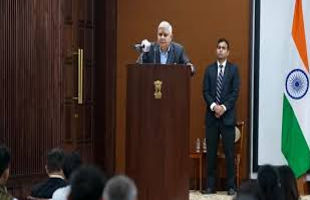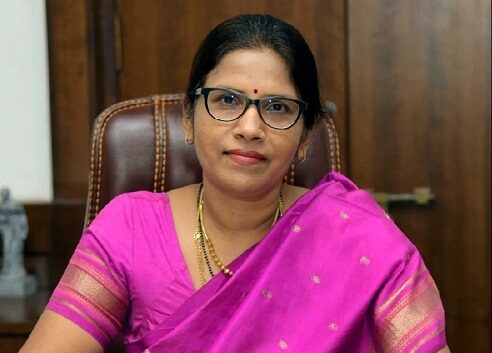VP Dhankhar Celebrates Uttarakhand Historic UCC Implementation

VP Dhankhar Celebrates Uttarakhand Historic UCC Implementation & India Growing Aspirations. In a remarkable statement, Vice-President of India, Shri Jagdeep Dhankhar, expressed his happiness as Uttarakhand became the first state in India to implement the Uniform Civil Code (UCC). The Vice-President highlighted the significance of this move, which he described as an “auspicious sign” for the nation, marking a major step toward fulfilling the vision laid out in the Indian Constitution. He also emphasized the ongoing rise in the country’s aspirations, security concerns, and economic progress under the leadership of Prime Minister Narendra Modi.
VP Dhankhar Celebrates Uttarakhand Historic UCC Implementation & India Growing Aspirations
Uniform Civil Code: A Step Towards Equality and Unity
Vice-President Dhankhar praised Uttarakhand for being a pioneer in adopting the Uniform Civil Code, making it a reality in the state. The UCC, as enshrined in Article 44 of the Indian Constitution, aims to provide a common legal framework for all citizens, promoting gender equality and social justice.
Key points from the Vice-President’s statement:
- UCC is a mandate from the Constitution, as envisioned by the framers, meant to establish a uniform legal system across India.
- The adoption of UCC in Uttarakhand is a crucial step in realizing the goal of gender equality and social justice.
- Dhankhar expressed disappointment over the political opposition to UCC, labeling it as a result of ignorance and political gain, urging citizens to embrace the Constitution’s vision for equality.
The Vice-President also underlined that once one state has made this progress, it is only a matter of time before the entire country follows suit in adopting the UCC, further cementing national unity and equal rights for all citizens.
Addressing Opposition: UCC and Nationalism
While celebrating the historic implementation of the UCC, Dhankhar took a strong stand against those opposing it. He questioned the basis of their criticism, arguing, “How can we criticize something that is a mandate of the Indian Constitution?” He added that political gain should never take precedence over national unity and gender equality.
The Vice-President pointed out that the debates during the constitutional assembly and numerous Supreme Court rulings have consistently supported the necessity of a uniform civil code. Reflecting its importance in ensuring equal rights for all citizens regardless of their religion or gender.
Security Concerns: Illegal Migration as a Threat
Another critical issue raised by Dhankhar was the growing problem of illegal migrants in India. He emphasized that millions of illegal migrants pose a significant challenge to the nation’s sovereignty, societal harmony, and security. These migrants, Dhankhar stated, do not align with India’s nationalism, nor are they contributing positively to the country’s development.
Key concerns highlighted by the Vice-President:
- Illegal migrants are a drain on national resources such as healthcare, education, and public services.
- They represent a serious threat to national security by potentially influencing the country’s electoral system and social stability.
- The situation requires urgent attention, and a long-term solution must be implemented to safeguard India’s sovereignty.
Dhankhar’s comments serve as a call to action for the government to take strong measures against illegal migration and prioritize the nation’s security.
Aspirations of the Indian People: Growth and Progress
The Vice-President celebrated the tremendous progress India has made in recent years. He pointed out that for the first time, millions of people across the country have access to basic amenities like toilets, gas connections, internet, and road connectivity. These advancements, he noted, have raised the aspirations of the Indian population.
Shri Dhankhar emphasized the growing ambition of the Indian people: “People’s aspirations are touching the sky,” and added that they now envision India becoming the world’s number one nation. The increased access to resources and opportunities has created a sense of hope and possibility throughout the country.
However, Dhankhar expressed some concern over the youth’s focus on government jobs. He encouraged them to broaden their horizons and take advantage of the expanding opportunities in diverse sectors beyond the traditional government career path.
India’s Economic Upturn: A Decade of Progress
Reflecting on India’s economic growth, the Vice-President highlighted that the nation has experienced a massive economic surge over the past decade. He noted that India’s economic landscape has transformed, marked by exponential growth in infrastructure, technological advancement, and policies that support the youth.
Achievements in the last decade include:
- An unprecedented economic upturn.
- Rapid infrastructural development.
- Increased technological penetration in rural and urban areas.
- Pro-youth policies and initiatives aimed at fostering skill development and entrepreneurship.
Shri Dhankhar lauded the efforts of Prime Minister Modi in leading these transformative changes, especially the development of aspirational districts. The government’s emphasis on inclusivity and national growth has resulted in a newfound optimism among the people.
Also Read – India and Indonesia Strengthen Ties A Historic Visit by President Prabowo Subianto
Conclusion: A Vision for a Unified and Prosperous India
Vice-President Dhankhar’s remarks painted a picture of a rapidly advancing India—one where aspirations are high, opportunities are vast, and challenges like illegal migration and gender inequality are actively addressed. The adoption of the Uniform Civil Code in Uttarakhand is just the beginning of a nationwide effort to bring about a unified, progressive, and equal society.
As India moves forward into the future, it is clear that the people of the nation, supported by visionary leadership, are on a path of economic, social, and cultural growth. The implementation of the UCC and other forward-thinking policies reflect a country ready to embrace its rightful place as a global leader.



